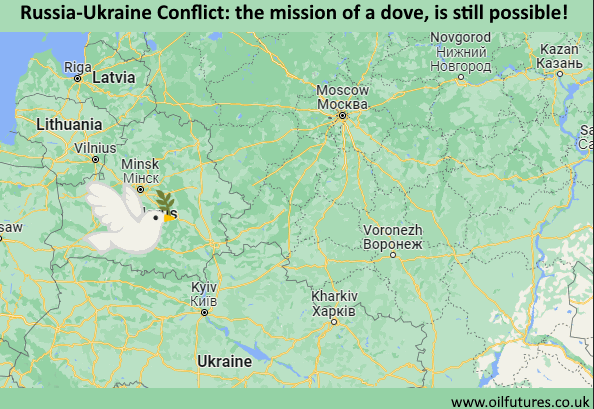With the
price of crude oil already reaching 14-year high, the stakes cannot be any
higher for the global economy as a whole. As of 12:45 GMT, WTI and Brent recorded
$110.45 and $112.69 respectively.
The anxiety
in Europe on many fronts is palpable and may soon drift out towards the periphery
of the planet slowly, but steadily, unless a miracle happens in changing the status-quo.
Even the
Western leaders, who were compelled to impose heavy sanctions on Russia, may be
wondering about the inevitable consequences on their economies due to the mushrooming
energy crisis - just one among many; releasing the SPRs, Strategic Petroleum Reserves, did not do the
trick in the past; nor will it do in the future, as its positive impact has
clearly been eclipsed by the concerns about the potentially serious supply side
problems – of course, if the conflict goes on for long.
Although the
West has been a unifying front at present against Russia, cracks may appear in
the alliances when the individual economies cannot handle the burden anymore, especially, those which still rely on Russian gas; finding
substitutes at short notice is easier said than done.
In order to
address the shortage of crude oil supply, there is only one thing that needs to
be done – increasing the very thing in question.
Owing to the
pledges made to going green, even the Western countries that have huge petroleum
and gas reserves, cannot go back on their word while reversing the policies;
the USA is a case in point.
Against this
backdrop, the prospect of reviving the Iranian nuclear deal has been grabbing
headlines recently; the Iranian state-backed media, however, has lost some of
the optimism about the revival – in a stark contrast to their previous
positions, two weeks ago.
If the West
and Iran can revive the deal, it certainly is going to be a short-term game
changer, though: on one hand, Iran wants to boost its coffers, having suffered
for years under sanctions; the West, on the other hand, wants oil – a lot of it
in the current circumstances. In short, it is a win-win situation for both.
At the war
front, meanwhile, there was a ray of hope yesterday despite the heavy fighting, claims and counter-claims: the
Russian and Ukrainian delegations met in Belarus on Thursday and even agreed to
explore the possibility of establishing a land corridor for the transport of
goods via the safe passage.
Although
President Putin maintains a tough position against Ukraine at the moment, there
is a possibility of reaching a compromise in the coming days: Like President
Trump – and President Erdogan of Turkey for that matter – President Putin has
showed, time and again, the tendency to bury the hatchet, repair strained friendships
and then move on, without losing the focus on Russian interests, of course.
For instance,
when a Russian fighter jet was shot down by Turkey near its border a few years ago,
at the height of the Syrian conflict, President Putin and President Erdogan
publicly fell out and the former even threated to install Russia’s S-400 anti-missile
system near the border; less than a year later, however, not only did they get
their friendship back on track, but also managed to seal a defence deal,
procuring the same anti-missile system, incurring the wrath of the big powers
of the NATO, in which the latter is a significant member.
President
Trump was no different; he addressed the North Korean leader in unflattering
terms in the UN General Assembly in 2017, when the whole world was watching him
– and the session. In less than a year later, they met in person on North
Korean soil, built up a lasting friendship and the former even started
addressing the latter as, Chairman Kim.
In this
context, President Putin too may soften his stand in order not to let the
crisis get out of hand.
The world is
holding its collective breath up until such a development becomes a reality, exactly the
way President Kennedy brought the Cuban Missile Crisis to an end in the early
60s.
It is the
ultimate wish of the beleaguered Ukrainians, anxious Europeans, investors in
general and of course, a huge audience of oil and gas consumers right now,
regardless of the economic zone they belong to. Otherwise, we will sleepwalk into a heavily polarized world that makes the Cold War era pale into insignificance.







